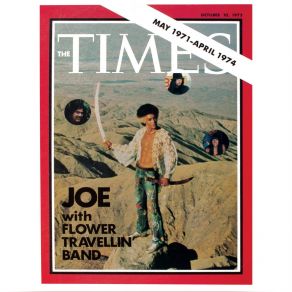The Times
Download links and information about The Times by Joe Yaman Flower Travellin' Band. This album was released in 1975 and it belongs to Rock, Hard Rock, Heavy Metal, Psychedelic genres. It contains 8 tracks with total duration of 47:35 minutes.

|
|
|---|---|
| Artist: | Joe Yaman Flower Travellin' Band |
| Release date: | 1975 |
| Genre: | Rock, Hard Rock, Heavy Metal, Psychedelic |
| Tracks: | 8 |
| Duration: | 47:35 |
| Buy it NOW at: | |
| Buy on iTunes $9.99 | |
Tracks
[Edit]| No. | Title | Length |
|---|---|---|
| 1. | Satori, Pt. II | 7:06 |
| 2. | Satori, Pt. I | 5:17 |
| 3. | Shadows of Lost Days | 4:50 |
| 4. | Hiroshima | 5:15 |
| 5. | Make Up | 3:05 |
| 6. | Look at My Window | 11:47 |
| 7. | Spasms | 5:23 |
| 8. | I Wanna See You | 4:52 |
Details
[Edit]Originally released in 1975, The Times was a best-of collection repackaging some of the most accessible moments from Japanese psychedelic rock pilgrims the Flower Travellin' Band. The album pulls tracks from their hard-edged 1971 masterpiece Satori, 1972's follow-up Made in Japan, and their half-live/half-studio 1973 double album Make Up. Joe Yamanaka's howling vocals and percussion augmentations lead the band on trips both heavy and reflective over the course of the album's eight extensive tracks. The lead guitar work throughout is a highlight, and the refined sense of controlled mayhem in both playing and adventurous guitar tones becomes a major trademark of the band. The ominous doomsday sludge of "Hiroshima" ranks with some of Black Sabbath's most demonic early riff-fests, but made more uneasy with traditional Japanese scales being mutated into droning tradeoffs between vocals and guitar. The two-part "Satori" is a perfect highlight of the band's dual guitar work, while the epic soft psych journey of "Look at My Window" borrows from the mid-'60s San Francisco acid rock scene. There's a heavy Jefferson Airplane and Grateful Dead influence, but over its 11-plus minutes, the song melds summery harmonies with acoustic explorations akin to Popol Vuh's mellower soundtrack work. The Times is definitely an overview, and the band's official first album Satori is a more fully realized and cohesive statement, but The Times offers a fantastic (if truncated) look at one of the better obscure groups from the heyday of experimental psychedelia.